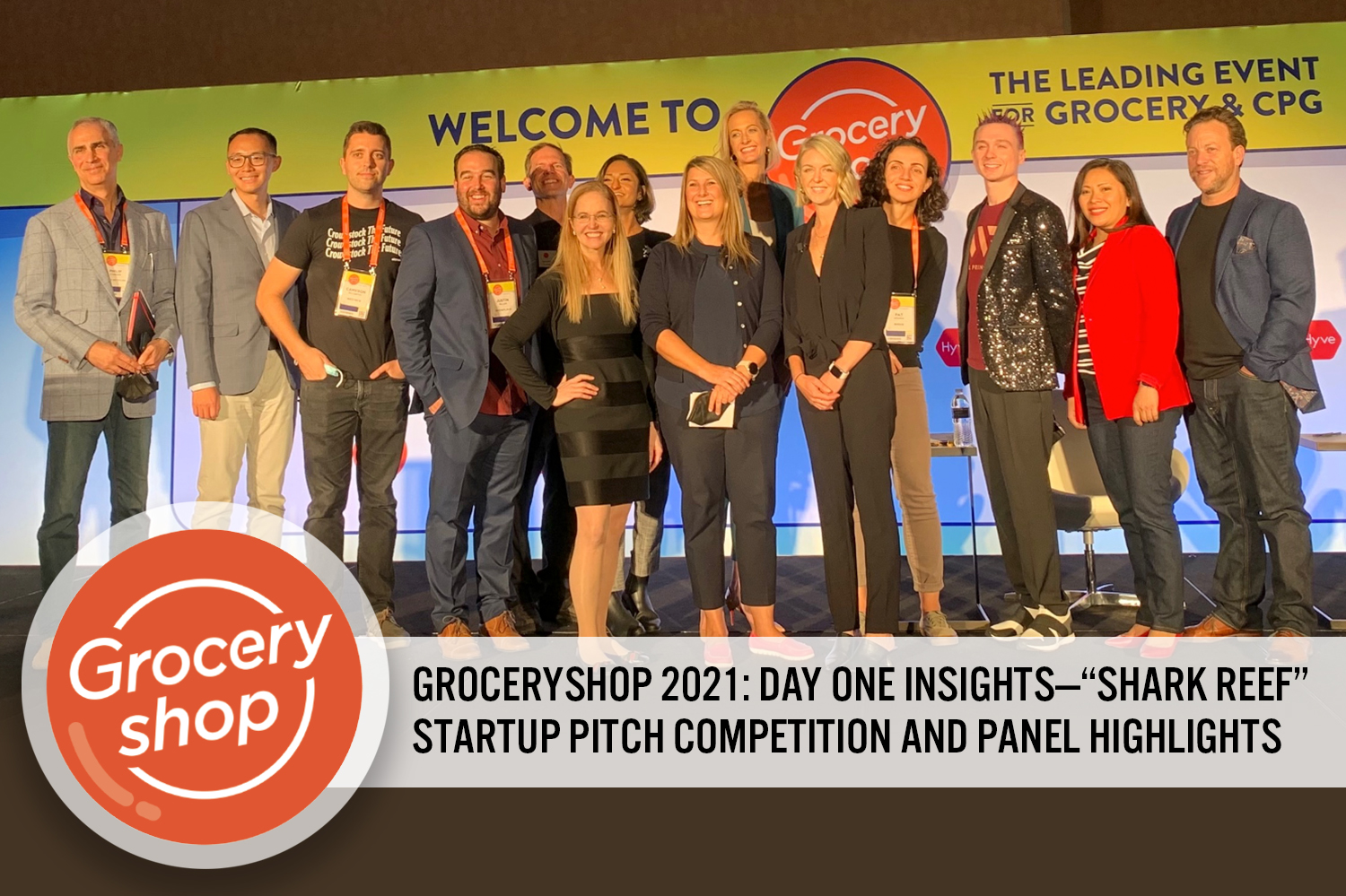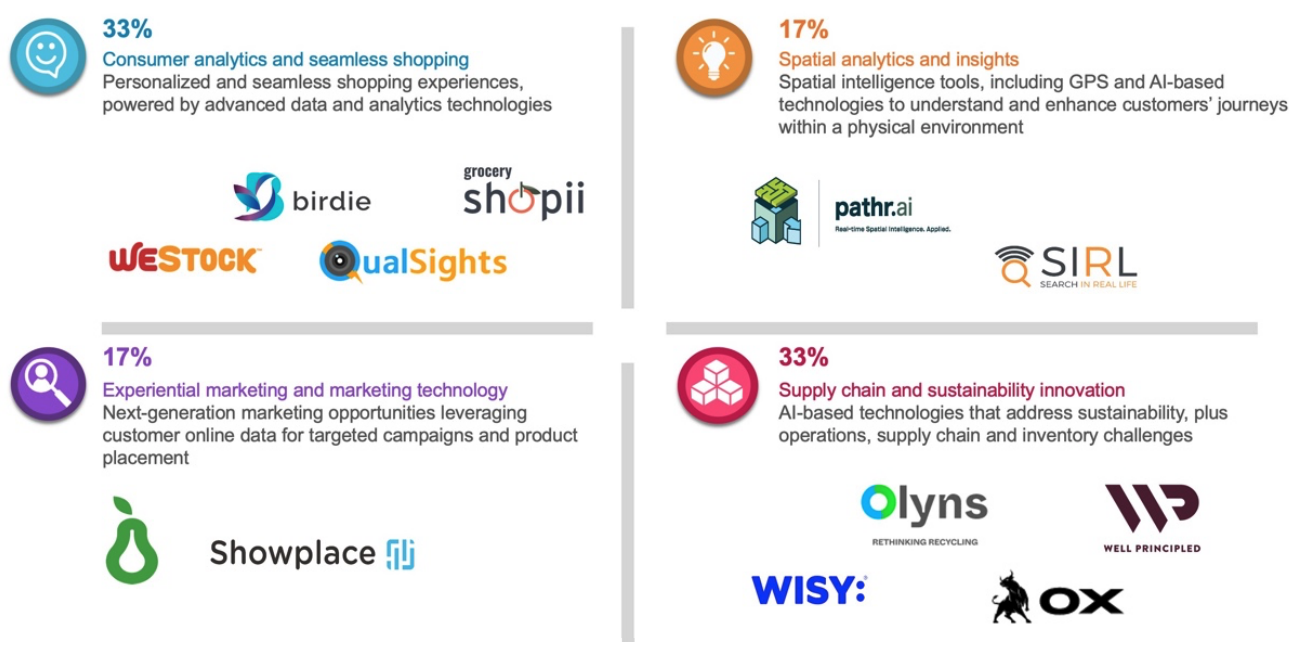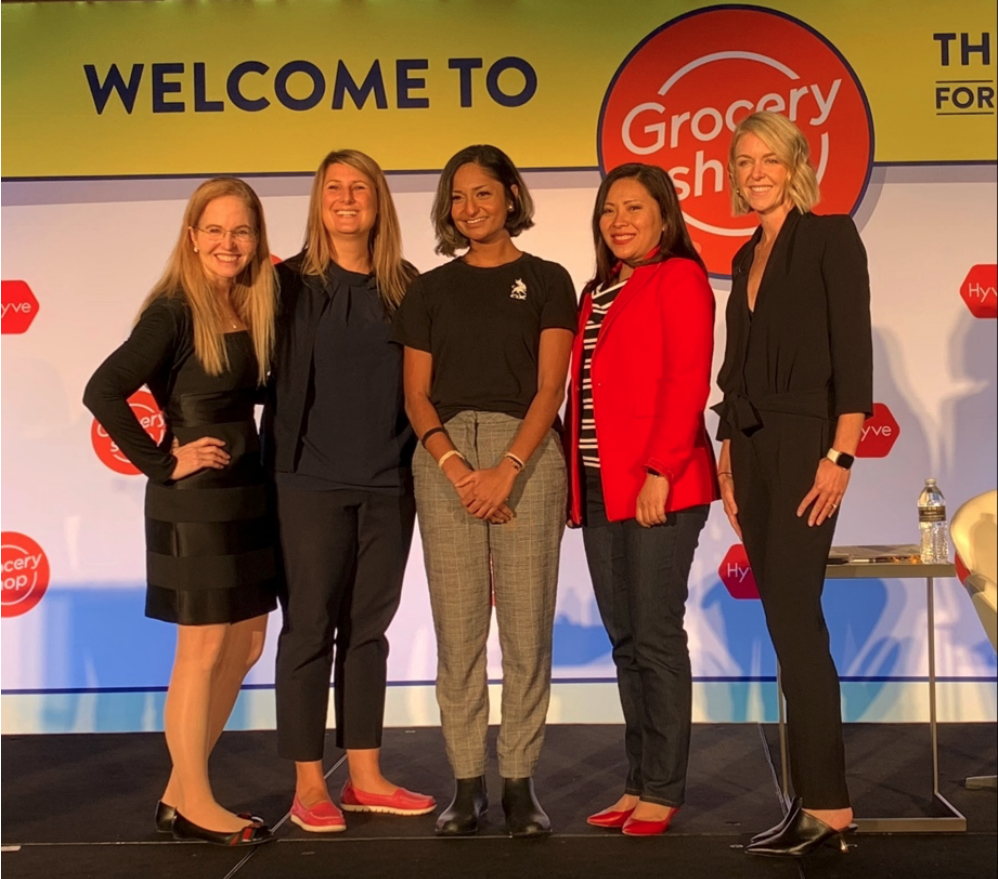
Nitheesh NH
What’s the Story?
The Coresight Research team is attending and participating in the Groceryshop 2021 conference, which runs September 19–22, 2021, in Las Vegas, US. Featuring more than 150 CEOs and over 200 speakers, the conference will address the sudden transformation in the retail environment since the outbreak of Covid-19, focusing on technology and innovation in consumer packaged goods (CPG), food and grocery. On September 19, 2021, Deborah Weinswig, CEO and Founder of Coresight Research, emceed and featured on the judging panel for the Groceryshop 2021 “Shark Reef” Startup Pitch Competition, in which 12 early-stage US retail-technology startups competed to win the Shark’s Choice and Audience Choice awards. In this report, we discuss the pitch competition and announce the winners. In addition, we present highlights from four presentations given on the first day of Groceryshop 2021. Weinswig and Ken Fenyo, President of Research and Advisory at Coresight Research, will participate in three panel discussions at Groceryshop 2021 across Tuesday, September 21 and Wednesday, September 22. Look out for our upcoming coverage of the panels this week. Day One Insights: The “Shark Reef” Startup Pitch Competition The Pitches The Groceryshop 2021 “Shark Reef” Startup Pitch Competition comprised three sessions through the day, across which 12 retail-technology startups each gave a three-minute presentation to a panel of expert judges and the audience on how their innovations and solutions are impacting the retail industry. After each presentation, each company participated in a four-minute Q&A session led by Weinswig and the two other judges, Brita Rosenheim, Partner at strategic and transaction advisory services firm Culterra Capital and Elaine Russell, Co-Lead for Albertsons Fund at venture capital and technology Greycroft. The Participants The startups in the pitch competition were required to meet the following five criteria:- B2B—Each company provides a business-to-business solution.
- Pre-Series-A—Each company has raised less than $5 million in funding.
- Age—Each company was founded within the past five years.
- Scalable—Each company has a business model with strong growth prospects.
- Grocery/CPG—Each company solves an industry problem relevant to CPG, food and grocery.
Figure 1. Four Areas of Disruption: Pitch Competition Startups [caption id="attachment_132845" align="aligncenter" width="700"]
 Source: Company reports/Coresight Research[/caption]
Figure 2 provides an introductory profile of each participant. Read our Groceryshop 2021 Preview report for more on each company.
Source: Company reports/Coresight Research[/caption]
Figure 2 provides an introductory profile of each participant. Read our Groceryshop 2021 Preview report for more on each company.
Figure 2. “Shark Reef” Pitch Competition: Startup Profiles [wpdatatable id=1271]
Source: Company reports/Coresight Research
The Voting Process and Winners Following the presentations and Q&A, Weinswig outlined the following criteria to the audience as a suggestion on how to vote for the winning startup:- Team—Do the team inspire confidence in executing the company’s aim?
- Market opportunity—Does the startup address a big problem or area of opportunity?
- Business model—How feasible is the company’s business model?
- Potential—Will the company be able to scale?
 Groceryshop 2021 startup pitch competition winners. Left to right: Deborah Weinswig; Brita Rosenheim; Founder and CEO of Ox Charu Thomas; Co-Founder and CEO of Wisy Min Chen; and Elaine Russell.
Groceryshop 2021 startup pitch competition winners. Left to right: Deborah Weinswig; Brita Rosenheim; Founder and CEO of Ox Charu Thomas; Co-Founder and CEO of Wisy Min Chen; and Elaine Russell.Source: Coresight Research[/caption] Conference Opening Remarks and Panel Highlights General Manager of Groceryshop Rebecca Sausner introduced day one of Groceryshop 2021, stating that more than 2,100 attendees and 170 speakers had signed up for the conference. We present key insights from four presentations given on September 19, 2021. Albertsons: The Future of Food Delivery In this session, Jon Springer, Executive Editor of grocery and supermarket news publication Winsight Grocery Business, interviewed Chris Rupp, EVP and Chief Customer and Digital Officer at Albertsons Companies. Rupp explained that at the onset of the pandemic, associate safety was the top priority for Albertsons, followed by the need to scale the company’s grocery delivery service. Albertsons first focused on ensuring every delivery order was correct and on time to ensure the quality of its operations before expanding the program. Albertsons is developing automated facilities through its partnership with Takeoff Technologies, as well as an in-house tool for manual shopping. In addition, at Groceryshop, the company announced its cooperation with online food ordering and food delivery platform DoorDash, in which consumers can order items from both Albertsons and another merchant, for example takeout food from a restaurant for dinner and items from Albertsons for breakfast the next day. The goal is to offer greater convenience for the consumer, even by offering delivery services for prepared food from competitors. Kroger: The Future of Food Shopping In this session, Kroger Chairman and CEO Rodney McMullen was interviewed by Groceryshop SVP Content, Krystina Gustafson. The participants discussed the significance of ultrafast delivery for retail, following Kroger’s recent announcement of a partnership with Instacart to deliver groceries in 30 minutes or less. Kroger has also started grocery delivery in Florida and other regions, acting on its aspiration “to feed America” in the one-third of the US that Kroger currently does not cover. McMullen also discussed the future of consumer trends such as the pandemic-induced shift to online shopping and the impact on the grocery market. The participants expect to see retention of this consumer habit, with McMullen stating that now that many consumers had learned new cooking skills during lockdown, they would want to show off their aptitudes by cooking for friends and family at home. Whereas emerging grocery startups typically offer 2,000–3,000 stock-keeping units (SKUs), Kroger believes that its strength lies in its variety as it offers the remaining 30% of unusual ingredients that cooks need, especially for those wanting to host at home or experiment with new dishes. The Reinvention of Experiential Grocery: Tactics for Elevating Store Experiences This session involved Melissa Gonzalez, Founder and CEO of retail consulting agency The Lionesque Group; Peter Cloutier SVP of Commercial Strategy at design firm ChaseDesign; and Rocquan Lucas, Content Director at Groceryshop. The panel discussed the tenets of experiential retail, highlighting that it needs to be functional as well as emotional, and that imagery, lighting, store layout and the number of SKUs available all play a role in creating a sense of inspiration and discovery. This led the panel to identify discovery as a big part of what consumers are looking for today. This can be facilitated through enhanced brand education through social media platforms, and facilitating “Instagrammable” brand moments to tap into younger audiences. New Store Formats, Layouts and the Changing Role of the Store This panel featured James Cook, Head of Americas Research at retail and leisure real estate consultancy JLL; Mike LaVitola, Co-Founder and CEO of Chicago-based convenience store chain Foxtrot; Deirdre Zimmermann, Chief Customer Experience Officer at supermarket chain Raley's Family of Stores; and Joanne Heyob, SVP of Operations Strategy and Design at architectural services firm WD Partners. The panel discussed new store formats and configurations that grocery retailers are testing to handle explosive digital growth, including dark stores, BOPIS services and curbside pickup. While 2020 was the year of pickup and delivery, grocery is leveraging its experiential side to make stores into more of a lifestyle destination. The panel agreed that the best way to grow online businesses is through offline experiences—such as through spaces where consumers want to visit several times each day. The panelists discussed the example of grocery spaces that offer lunch products at noon and transition into a wine bar in the evening. While retail is increasingly shifting toward lifestyle-related offerings, many traditional functions remain essential—for instance, retailers that do well on fresh food win, pickup and delivery remain important, and retailers need to execute well to prevent out-of-stocks.